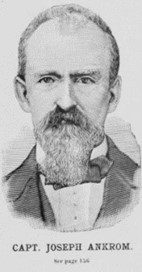Ironton Register 24 Nov. 1887 – “Well, Captain Jake Emmons, it’s your time,” said the Register reporter to Capt. Jake Emmons as he was getting a span of nags together for a ride to Portsmouth.
“Time for what?” he asked with some curiosity. When we told him, a “Narrow Escape” for the Register, he took a seat by the stove, gave the fire a few pokes, and said, “Really I don’t know anything that was quite so thrilling to me as my capture. I can tell you about that. It was not a great affair, but it was particularly interesting to me.” “Very well,” said the reporter, the ‘Narrow Escapes’ are intended to give personal reminiscences, and the accounts of such events as where the narrators were themselves, actors.”

“Well, sir,” replied Captain Jake Emmons, “it was on the 4th of July 1863, or rather about midnight, that the affair took place. We were then stationed at Fayetteville and 22 of us were sent out under Capt. Ankrum to capture picket posts between Fayetteville and Raleigh. Nothing unusual occurred until we got beyond the 8-mile house and were riding along the ‘w’ that the course of the road made when we came upon a body of rebels stretched along the road and ambushed in the woods.
“We discovered them before they had a chance to fire a shot, and as they seemed to have a pretty good force, we turned back, intent on stealing out of that danger and returning, without capturing the picket post we had started for. We had got back to the 8-Mile House, or just beyond it, when Jack McMahon, who was in the advance guard, called back that the road was blocked ahead of him, and just then, Col. Thoroman of the reb force, stepped out and fired his revolver and cried ‘Surrender you d–n Yankees.’
This was the signal for a volley, and the shot was poured into us right lively. Jim Sweeny and Jake Myers were killed. Dick Barron and others were wounded there. Just as the firing commenced, I was near the stump end of a big tree, that had fallen by the roadside, and I jumped behind that and aimed a shot or two with my revolver. But, gracious it was no use. The flash of reb powder almost burnt my face.
Our boys tumbled back in great confusion, and I turned to go too when my knee struck a part of the tree and wounded me nearly as bad as a saber cut would, but I held on my horse and kept going, and going pretty fast too. Mart Goodman was just ahead of me, and his horse was shot and fell with a crash, and my horse tumbled right over him and pitched me off in the road.
“Well now, just then was a very scary time. It was dark, rebs all around us, my knee was hurt bad enough to prevent walking, thick woods on both sides of the road. I started to crawl across the road. Tom Wilson was with me.
Our idea was to get into the woods and hide. But before we got out off the road, two rebs got in front of us. Tom said, ‘we had better surrender,’ and I agreed with him, and soon the rebs were on us and we surrendered. They didn’t seem to treat us very nicely, and some made threats.
About that time Col. Thoroman came up, and tapping me on the shoulder, asked, ‘Didn’t you fellows swear you would take my life if you caught me?’ I replied, ‘I never made any such an oath – that I never expected to kill you unless it was done in a fair fight.’ Upon this answer, he ordered his men to treat us nicely and they did.
“The next day we were hauled off to Libby Prison. There were of us prisoners, Mark King, Wat Calford, J.K. Hastings, Josh Ashcroft, and Nick and Bill Doren. We were at Libby until the 22nd of December following when we were exchanged and returned to our regiment.
“We lost every horse in that little encounter but one, and that had five or six bullets in him when he returned to Fayetteville. He got away by jumping over a little embankment and skipping out to the woods. I have been in several engagements where the thunder and blood were worse, but I never had quite as scary a time as I had that night. It was a very dangerous experience, and to this day I tremble, when I recollect about a minute of that night.”

0 Comments